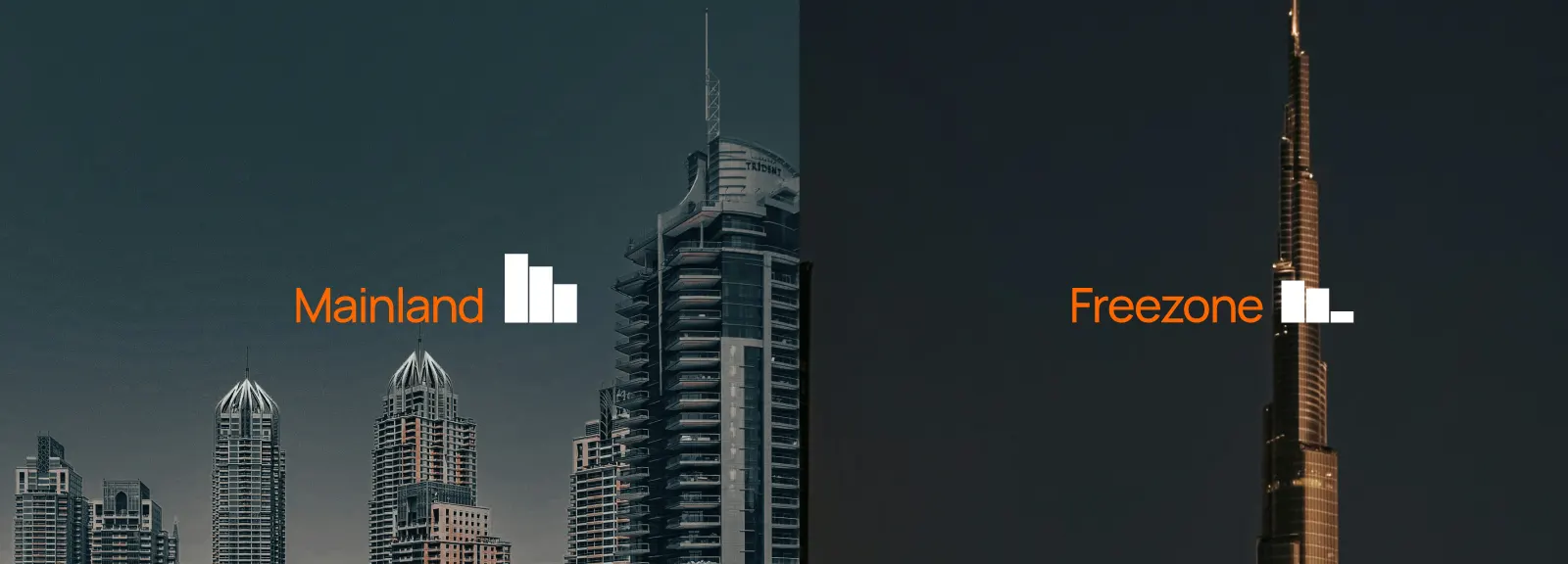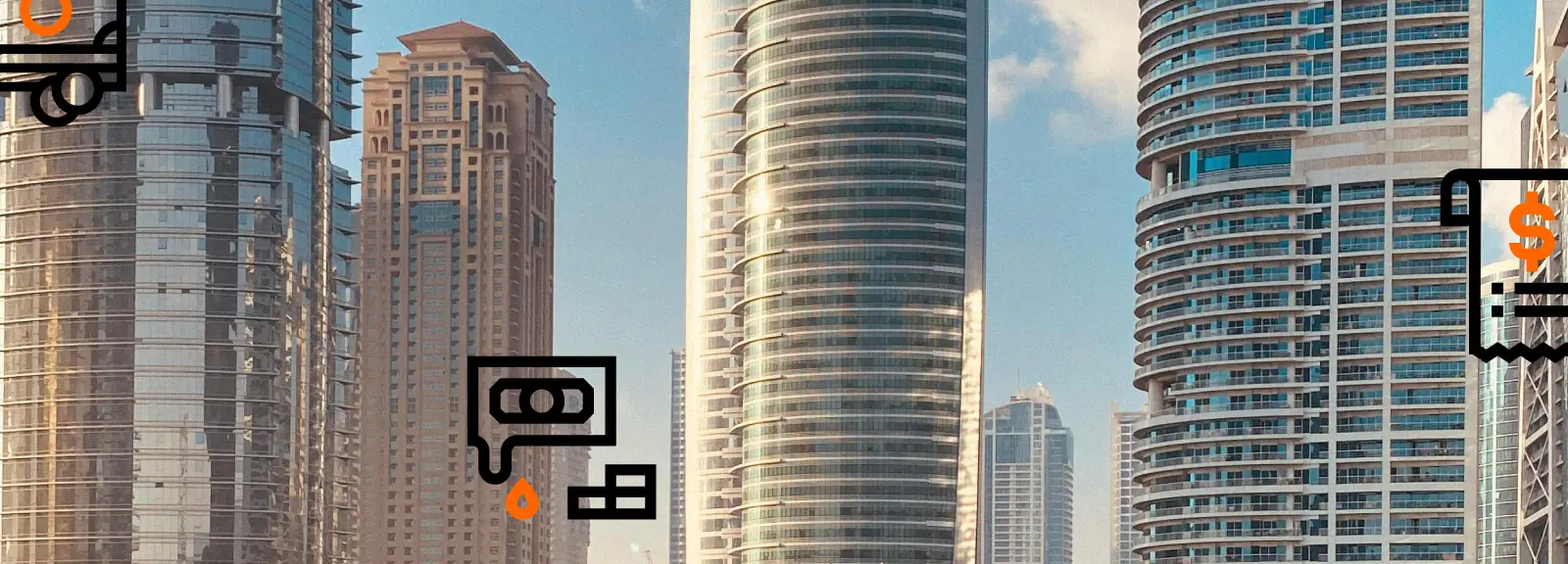Setting up a business in Dubai starts with one key move: getting a professional license. Whether you're launching a consulting firm, building an IT solutions company, or offering freelance marketing services, this license is the legal foundation for operating in the city.
In 2025, the process of getting a professional license in Dubai is faster than before, but it still requires careful planning and attention to detail. This guide provides a clear and current overview of how to secure a professional license and legally operate in one of the world’s most business-oriented cities.
This guide covers:
- The definition and significance of a professional license in Dubai
- The distinctions between setting up in the mainland versus free zones
- A detailed, step-by-step breakdown of the licensing process
- Required documentation and associated costs
- Common pitfalls to avoid
By the end, you’ll understand how to legally establish your business, access new markets, build client trust, and take advantage of long-term growth opportunities in Dubai’s competitive and global business environment.
Table of Contents
What Is a Professional License in Dubai?
A professional license in Dubai permits individuals or companies to legally offer services based on intellectual or artistic expertise. Unlike a commercial license, which is intended for buying and selling goods, a professional license is ideal for businesses providing consultancy, design, technical services, education, and similar offerings.
If you’re a freelancer, independent consultant, or service-based entrepreneur, acquiring a professional license in Dubai is the legal cornerstone of your business. This license is issued by the Department of Economic Development (DED) for mainland operations or by the respective authority if you opt for a free zone setup.
A professional license in Dubai encompasses services such as:
- Management consulting
- IT and software development
- Digital Marketing and media services
- Engineering and architecture
- Legal advisory (for qualified professionals)
- Business setup consultancy
- HR and recruitment services
- Health and wellness coaching
- Financial and tax advisory
Many of these services fall under the umbrella of the DED license in Dubai, which governs mainland operations.
If your target market includes UAE residents or mainland clients, or if you intend to establish an office anywhere in the city, a DED license in Dubai is generally required.
For activities that don’t involve trading or product sales, a UAE professional license ensures full legal compliance.
According to Dubai Economy, over 60% of new licenses issued in 2024 were service-related, reflecting a growing trend in professional licensing.
Mainland vs. Free Zone: Where Should You Set Up?
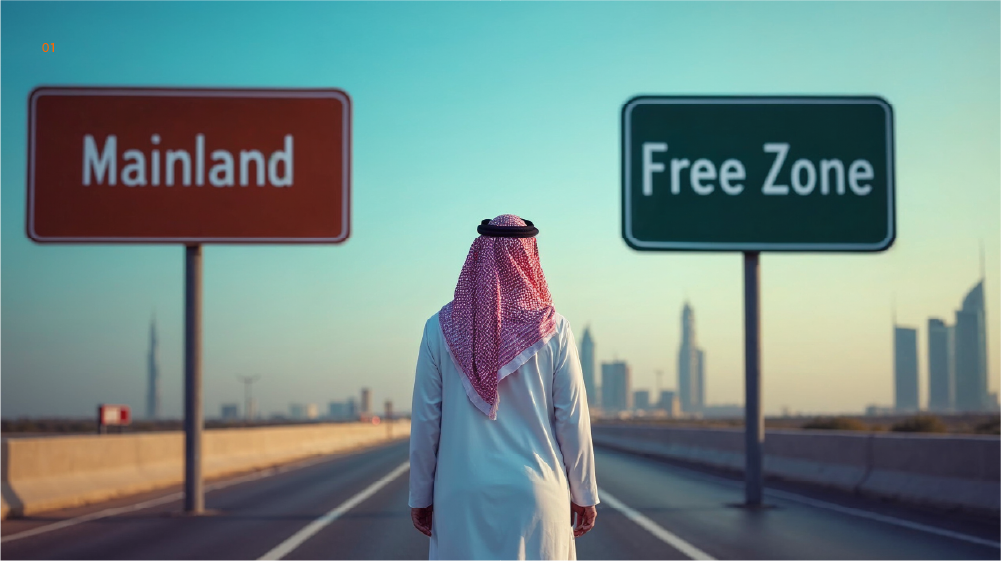
Before applying for a professional license in Dubai, it’s essential to decide whether to operate in the mainland or within a free zone. Both options offer distinct advantages and limitations.
Mainland Setup:
Local Service Agent (LSA): Foreign-owned businesses require an LSA, which is a UAE national who doesn’t hold ownership or decision-making authority.
Market Access: Allows direct trading and service provision to clients across the UAE.
Government Contracts: Eligibility to bid for government contracts and tenders.
Physical Office: Mandatory to have a physical office space registered with Ejari.
Free Zone Setup:
Ownership: 100% foreign ownership is permitted.
LSA Requirement: No need for a local sponsor or LSA.
Setup Efficiency: Generally faster setup with lower upfront costs.
Operational Scope: Limited to operating within the free zone or internationally unless a local distributor is appointed.
Popular free zones for service-based businesses include:
- Dubai Multi Commodities Centre (DMCC)
- Dubai Internet City (DIC)
- Dubai Knowledge Park (DKP)
- Dubai Media City (DMC)
DMCC was named “Global Free Zone of the Year” by the Financial Times’ fDi Magazine for the ninth consecutive year in 2023.
Step-by-Step Guide to Getting a Professional License in Dubai
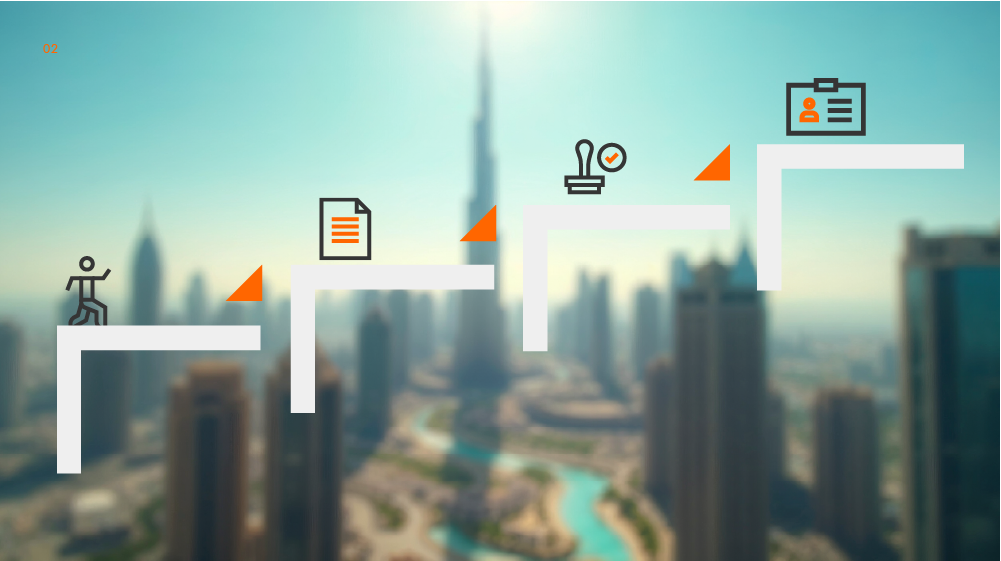
Securing a professional license in Dubai involves a clear and structured process. Below is a step-by-step breakdown to help you understand how to move through each stage smoothly and legally.
1. Choose your business activity
The first step is selecting the specific professional service you intend to offer. Dubai’s Department of Economic Development (DED) provides an extensive list of permitted business activities. It’s important to choose one that aligns with your background, experience, or qualifications. The accuracy of this selection directly impacts your ability to qualify for a professional license in Dubai, as the licensing authority must ensure that your proposed activity matches your expertise. If you are still unsure which type of business license you need, please check our article.
2. Decide on your legal structure
Your legal structure defines how your business will operate. For individuals working alone, a Sole Proprietorship is the most straightforward option. If you’re going into business with partners, a Civil Company is a common choice. The business structure you choose must be compatible with your chosen activity and business goals. Selecting the right legal setup is an important part of the overall application for a professional license in Dubai.
3. Reserve a trade name
Next, you’ll need to choose and reserve a trade name that complies with local regulations. The name should reflect your business activity and avoid restricted or offensive words. It must also not include references to religion, political groups, or other sensitive topics. A valid and approved trade name is required before submitting your application for a professional license in Dubai, as it becomes part of your official business identity.
4. Apply for initial approval
Initial approval is a no-objection certificate from the DED or the relevant free zone authority. This confirms that the government has no objection to you starting a business based on your selected activity. The process usually takes between one and three working days. While it doesn’t grant full permission to operate, this approval is a crucial step toward receiving your professional license in Dubai.
5. Sign a Local Service Agent (LSA) or Corporate Service Agent agreement (mainland only)
If you’re applying for a mainland license, you are required to appoint a UAE national as a Local Service Agent. This individual does not have ownership or control over your business but acts as a formal liaison for regulatory purposes. This agreement is legally necessary to complete the application process for a mainland professional license in Dubai.
6. Prepare your documentation
Proper documentation is essential to avoid delays. You will need to submit a valid passport copy, visa (if applicable), Emirates ID, proof of address, educational certificates, and a signed office lease. In some cases, documents may need to be notarized. Ensuring that everything is complete and accurate helps streamline your application for a professional license in Dubai.
7. Secure office space
For mainland licenses, having a physical office is mandatory. The office must be registered through the Ejari system, which formalizes the lease under Dubai’s regulations. The size and type of office space should be appropriate for your business activity.
8. Submit the final application
Once all the documentation, approvals, and agreements are in place, you can compile and submit your final application to the DED or free zone authority. This step brings together everything from earlier in the process and is reviewed in detail before the license is issued. Submission must be accurate and complete to avoid rejection or delays in securing your professional license in Dubai.
9. Pay the licensing fees
Licensing fees vary depending on your activity, jurisdiction, and business setup. These fees typically include government charges, registration costs, and any applicable service agent or office space fees. Payment is the final administrative step before issuance of your Dubai professional license.
10. Receive your license
Once approved, you will receive your official license and can begin operating legally. With a professional license in Dubai, you can provide services, sign contracts, open a business bank account, and apply for visas. It marks the official start of your business journey in one of the world’s most dynamic and entrepreneur-friendly markets.
Required Documents Checklist
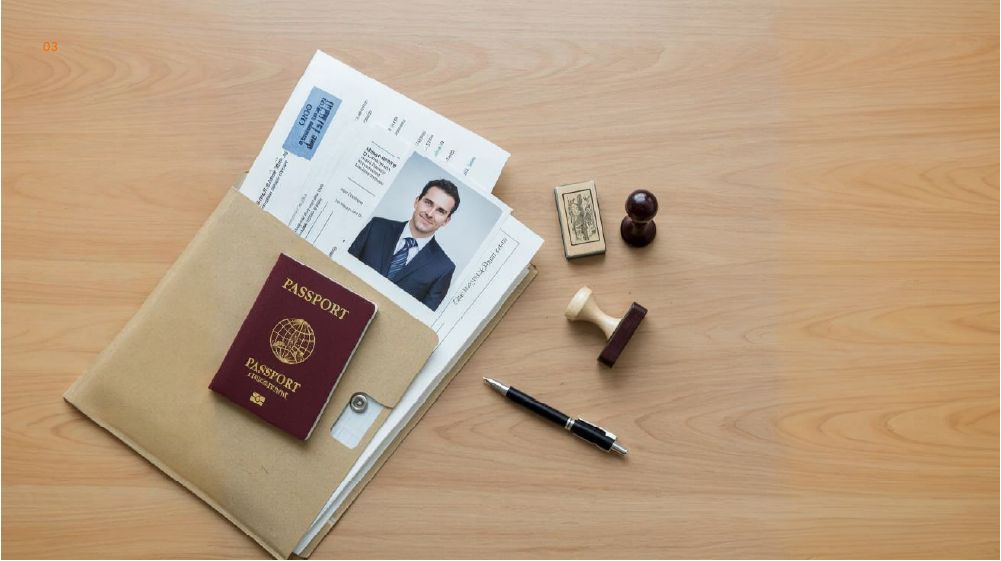
Before submitting your application, it is essential to gather and prepare all necessary documents carefully. Incomplete, outdated, or incorrect documentation is one of the leading causes of delays or even rejection in the licensing process.
Below is a detailed list of the documents you must have ready to ensure a smooth application:
1. Passport copies of all shareholders or partners:
You must provide clear, valid copies of the passports of every individual who holds shares or partnership in the company. These copies should include the identification page and any relevant visa pages, especially if the shareholders are residents of the UAE. Passports must be valid for at least six months at the time of application for a professional license in Dubai.
2. Visa copy (if resident):
If you or any of the shareholders/partners are residents of the UAE, a copy of the valid residency visa is required. This helps verify your legal status in the country and eligibility to own or participate in a professional business under the professional license in Dubai framework.
3. Emirates ID (if resident):
For residents, a copy of the Emirates ID card is mandatory. The Emirates ID is the official identification issued by the Federal Authority for Identity and Citizenship (ICA), and it plays a crucial role in confirming your identity.
4. No Objection Certificate (NOC) from current sponsor (if applicable):
If you are currently employed under a UAE sponsorship and intend to start a professional business on a freelance or commercial basis, you may be required to provide a No Objection Certificate (NOC) from your current employer or your local sponsor in Dubai.
5. Recent passport-sized photographs:
You will need recent color passport-sized photographs with a white background. These are typically required for licensing documents, Emirates ID processing, and other administrative formalities related to the professional license in Dubai application.
6. Educational and professional qualification certificates:
Depending on the nature of the professional activity you wish to conduct, you must submit certified copies of your educational diplomas, degrees, and any relevant professional certifications. For example, consulting, legal, medical, engineering, or accounting professions may require attested documents proving your qualifications and licenses from recognized institutions or authorities.
7. Tenancy contract and Ejari registration (for mainland licenses):
For mainland professional licenses, having a physical office space is mandatory. The tenancy contract must be valid and registered with Ejari, Dubai’s official lease registration system. Ejari registration ensures that your lease complies with the government’s legal standards and is critical for the final issuance of your professional license in Dubai.
8. Trade name reservation certificate:
Before applying for the professional license in Dubai, you must reserve your trade name with the Department of Economic Development (DED) or the relevant free zone authority. This certificate confirms that your chosen business name is unique, complies with naming conventions, and is approved for official use.
9. Initial approval certificate:
You will also need the initial approval certificate issued by the DED or free zone authority, indicating no objection to your intended business activity. This is a prerequisite for submitting the final license application and proves that your business concept meets regulatory requirements for the professional license in Dubai.
10. Local Service Agent agreement (for mainland licenses):
If you are setting up your professional business on the mainland, UAE law requires you to appoint a Local Service Agent (LSA), who must be a UAE national. The agreement formalizes this relationship and is required to complete your professional license in Dubai application. The LSA acts as a liaison with government departments but does not hold any ownership or managerial control over your company.
We suggest checking our in-depth guide about required documents for business setup in the UAE.
How Much Does a Professional License Cost?
The cost of obtaining a professional license in Dubai varies based on several factors, including your business activity, jurisdiction (mainland or free zone), and office space requirements. More information about Dubai license cost can be found here.
Mainland Setup Costs:
- License Fees: AED 10,000–13,000
- Trade Name & Approval: AED 620–720
- Office Space (Ejari): AED 15,000–30,000 annually
- LSA Service Fee: AED 5,000–8,000 annually
Free Zone Setup Costs:
- License Package (includes visa, office): AED 10,000–18,000
- Note: No need for LSA or Ejari
According to recent initiatives by the Dubai Department of Economy and Tourism, efforts have been made to streamline business setup processes and reduce associated costs for professional services.
Common Mistakes to Avoid
While the process of obtaining a professional license in Dubai has become more streamlined in 2025, several common pitfalls can still hinder or jeopardize your business setup.
Selecting the Incorrect Business Activity:
- Not all services fit neatly into one category.
- Mislabeling your activity can lead to application rejections or legal complications.
Failing to Meet Qualification Requirements:
- Certain services (e.g., legal, engineering) require relevant degrees or certifications.
- Ensure your activity aligns with your documented expertise.
Overlooking Office Space Regulations:
- Mainland licenses mandate an Ejari-registered office.
- Virtual offices are not accepted by DED for these licenses.
Attempting a DIY Approach Without Local Insight:
- Regulations can change frequently, especially for foreign-owned entities.
- Misunderstanding a regulation or missing a document can result in wasted time and resources.
Neglecting Renewal and Compliance Obligations:
- Licenses must be renewed annually.
- Late renewals can incur fines and affect visa statuses.
To circumvent these issues, many professionals collaborate with structuring experts like GCG, who specialize in DED licenses in Dubai and UAE professional licenses. Want to know how to start a business in UAE the right way? GCG can guide you through every step.
How GCG Structuring Ensures a Seamless Setup

Securing a professional license in Dubai requires more than a basic understanding of the process. It involves selecting the appropriate jurisdiction, preparing compliant documentation, and navigating regulatory requirements with precision. At GCG Structuring, we streamline this journey from start to finish.
We begin by assessing your business model and advising on whether a DED license in Dubai or a free zone structure is better aligned with your goals. Our team then takes full responsibility for preparing and submitting all necessary documents, ensuring every detail complies with current regulations.
Beyond execution, we offer strategic guidance ensuring your license reflects the correct business activities, avoids delays, and positions your company for long-term scalability.
FAQ
1. 0 Can I apply for a professional license if I’m not a UAE resident?
Yes. Non-residents can apply. However, you’ll need to appoint a Local Service Agent (LSA) if setting up in the mainland. Many entrepreneurs also choose to apply remotely through a free zone, which often simplifies the process. GCG Structuring can guide you through the best route based on your residency status.
2. 0 Do I need a physical office to get a professional license in Dubai?
For mainland setups, yes. A physical office space is generally required, even if it’s a flexi-desk or shared workspace. Free zones offer more flexibility, with many allowing virtual office setups for certain business activities. The licensing authority will specify what’s acceptable based on your application.
3. 0 Can I sponsor employees under a professional license in Dubai?
Yes, but there are limits based on the nature of your business, the size of your office, and the jurisdiction (mainland vs. free zone). A DED license in Dubai typically offers more flexibility in employee sponsorship than some free zones. It’s important to plan your staffing needs in advance when choosing your license.
4. 0 Is a university degree required to get a UAE professional license?
In most cases, yes. Especially if your activity falls under consulting, legal, medical, or technical services. Authorities often request attested academic or professional qualifications relevant to the service you plan to offer. Some licenses may also require professional experience in lieu of formal education.
5. 0 How long does it take to obtain a Dubai professional license?
Timeframes can vary depending on the jurisdiction and completeness of your documents, but on average, it takes 5 to 10 working days. Free zone setups may be quicker, while certain mainland activities requiring external approvals (e.g., legal or medical consulting) may take longer. With GCG Structuring managing the process, delays are minimal.
6. 0 Can I operate across the UAE with a professional license issued in Dubai?
If you have a mainland license, you can operate anywhere in the UAE. However, if your Dubai professional license is issued by a free zone, your activities are technically limited to within that zone or internationally, unless you appoint a distributor or obtain specific permits to do business in the mainland.
7. 0 What happens if I operate without the correct professional license in Dubai?
Operating without the appropriate license can result in fines, business closure, legal penalties, and even a ban from operating in the UAE. Each business activity must be explicitly licensed, and authorities conduct regular checks. Compliance is non-negotiable.
8. 0 Can I change my business activity after obtaining a professional license in Dubai?
Yes, but you’ll need to apply for a license amendment, which may involve new approvals, revised documentation, and possibly a fee. It’s essential to ensure the new activity aligns with your existing legal structure. GCG Structuring can handle this process to avoid disruption.
9. 0 Do I need to renew my professional license every year?
Yes. All professional licenses in Dubai, whether mainland or free zone, require annual renewal. This includes trade name registration, tenancy contracts (Ejari for mainland), and employee visas, if applicable. Missing renewal deadlines can lead to penalties or suspension of your license.
10. 0 Is VAT registration required for holders of a Dubai professional license?
VAT registration is required if your taxable supplies and imports exceed AED 375,000 annually. Even if you’re below this threshold, voluntary registration may be beneficial. Consulting with a tax advisor is recommended to ensure you’re fully compliant with UAE tax regulations.


